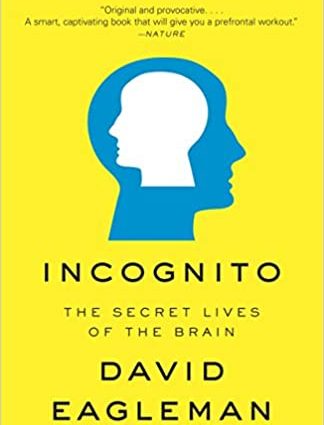Incognito by David Eagleman

To find out how to learn quicker, it’s good to understand how the brain works, at least to familiarize with the current state of what humanity knows about it. One book, which is ranked very high in neuroscience section is “Incognito” by David Eagleman. He is an American neuroscientist and science communicator. He teaches as an adjunct professor at Stanford University and is CEO of NeoSensory, a company that develops devices for sensory substitution.
Do we really see everything?
One of the common misconceptions is that we think we see everything and perceive the reality as it is. However author provides many scientific proofs this is not the way it is. First, we think our eyes provide us with images like the digital camera. However, the existence of optical illusions causes us to believe, there is a part of the brain that receives the signals from eyes and interprets it. Finally, what we see is rather a retouched picture rather than original. To provide a good experience, our brain sometime makes things up. This is the case with the blind spot, a place where there are no light sensors on the retina and therefore is light insensitive. Brain is constantly analyzing what is around the holes to fill the blanks.
Brain’s Achilles’ heel
We are not good in detecting changes. The scientific term for this is change blindness. This means we need to direct our conscious attention to find differences, otherwise the programs in supercomputer between our ears will think this is not important for us. In fact, this is the reason it is recommended to the people who want to better understand the text, to ask questions prior to reading. As a result, they will give their subconscious a hint to what is important.
Scientists have proven that the left hemisphere is continuously trying to make sense of what is happening in the entire system and it provides us with this information. Yet sometimes is doesn’t have all informations so it makes things up. This might be the reason we remember our dreams with many details. It turns out there was something stitching the dream imagery together and providing a narration.
Brain’s advantages?
The biggest advantage of the human brain is its efficiency and plasticity. Kasparov did not burn as much energy as Deep Blue. Excellence comes with automatism. Experts have mastered their skills to such a level, that they are burned deep into the circuitry. In one study, the game players who played a game for the first time showed a lot more brain activity than the ones already familiar with it.
Law based on the brain
Much of the book is devoted to a question of legal system and the question if criminals who have changes in brain but no biological signs of it, should be dealt with differently. Question of blameworthiness the author would replace with modifiability. To what degree are we sure that the man can change.
